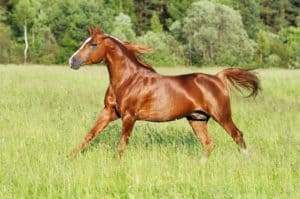Expert: Equine TMJ Changes Common, but Clinical Signs Rare

Or not.
This small joint, located on each side of the jaw, is almost solely responsible for allowing mammals to open and close their mouths. Almost 40% of horses have anatomical anomalies in the joint attaching the jaw to the skull, said James Carmalt, MA, VetMB, MVetSc, PhD, FRCVS, Dipl. ABVP, AVDC, ACVSMR, ACVS, professor of equine dentistry, surgery, sport medicine & rehabilitation at the University of Saskatchewan’s Western College of Veterinary Medicine, in Saskatoon, Canada. Additionally, as horses age, they can accrue wear-and-tear changes characteristic of osteoarthritis (OA) in their TMJs—but that doesn’t mean those alterations are affecting them.
“We’ve been looking for clinical signs of TMJ disease (specifically OA) in horses for 15 years, and so far we’ve only confirmed two cases,” said Carmalt
Create a free account with TheHorse.com to view this content.
TheHorse.com is home to thousands of free articles about horse health care. In order to access some of our exclusive free content, you must be signed into TheHorse.com.
Start your free account today!
Already have an account?
and continue reading.

Written by:
Christa Lesté-Lasserre, MA
Related Articles
Stay on top of the most recent Horse Health news with












